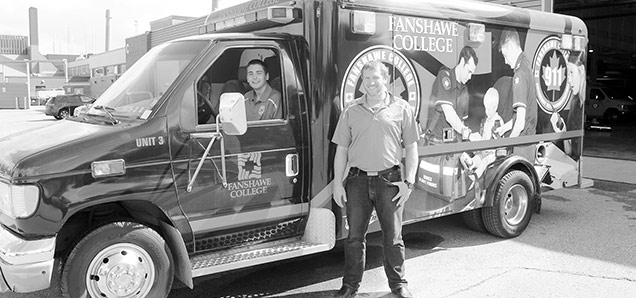Are you hurt? Call SERT!
 CREDIT: STEPHANIE LAI
CREDIT: STEPHANIE LAISERT leaders Jeff Bryant (driver) and David Seward are seeking 25 more student volunteers to complete the SERT team this year.
Before you call 9-1-1 for an emergency on campus, try giving Student Emergency Response Team (SERT) a call. It might save you a trip to the hospital.
SERT provides first aid to students and faculty on campus. “Anybody on campus that has a medical emergency, we're available for,” said David Seward, Fanshawe student and SERT team leader.
The team receives calls that range from cut fingers to unresponsive patients. “It can be what's considered minor to very extreme,” said Seward.
To determine if patients require 9-1-1 help, team members are trained in Emergency First Responder Level. “That's above the standard first aid, so we can give a higher grade of first aid to a person in need,” Seward said. “We have a better understanding of when somebody needs 9-1-1 response.”
SERT members try to respond to a call within two minutes. Because of this, Seward said team members are allowed to enter class with a radio, a uniform and first aid equipment. “They can respond to the call from class ... They're ready to be deployed.”
Currently Seward says there are 15 returning members, but the team is looking for more students to sign up to join the team. “We're recruiting another 25, so we're going to aim for 40 to 45 volunteers for the year.”
Volunteers are asked to commit to four shifts a month, at four hours per shift. Last year, hours for Thursdays and Fridays were extended from ending at 11 p.m. to ending at 3 a.m.
“[Our members are offered] a gift card incentive in order to take those later night shifts,” said Seward. “It really motivates our team to show up and be at school late at night.”
The late nights cover students' return from bars, said Seward. “The majority of our calls happen at that time.”
Seward described SERT as being like a middleman, “acting as that person in between, whether we can apply the needed first aid or if we need to ask for more assistance from paramedics to get the person to the hospital to medicate their need.”
Seward's co-team leader, Jeff Bryant said that SERT does see a lot of cuts, fractures and unresponsive people, but will call 9-1-1 if the team is unsure of treatment. “We assess and we delegate the decision if it's needed or not, but if there's any doubt, then we call. It's not like we're choosing,” said Bryant.
For medical emergencies on campus, call SERT at 519-542- 4242 on Mondays through Wednesdays from 8 a.m. to 11 p.m. and Thursdays and Fridays from 8 a.m. to 3 a.m. For calls outside SERT hours, Campus Security Services are available at 519-542-4242 to respond to all medical emergencies.
To sign up to be a volunteer with SERT, log in to MyFanshawe, and select “Campus Security” from the “Campus Life” dropdown menu. From there, choose the “Student Emergency Response Team” tab and complete the application form. Bring the completed form to the Campus Security office in D1027.













